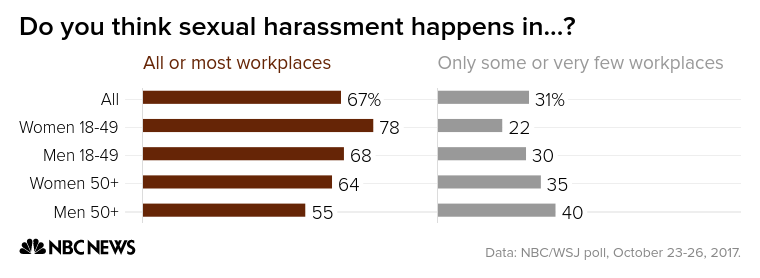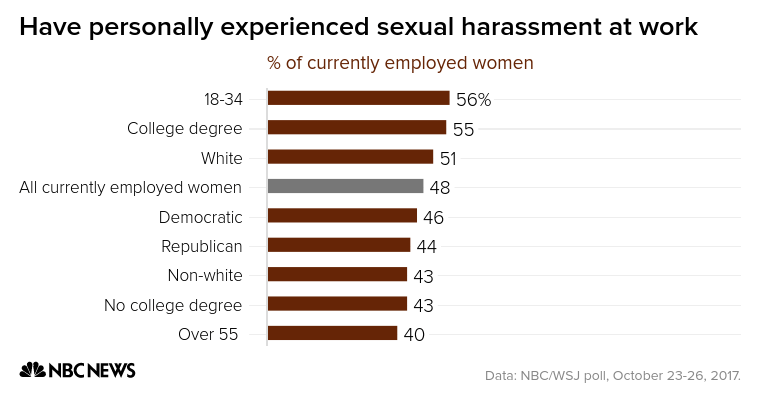WASHINGTON — As women around the country continue to come forward with accusations of sexual harassment by famous men in media and beyond, about half of American working women say: #MeToo.
A new poll conducted by NBC News and the Wall Street Journal shows that 48 percent of currently employed women in the United States say that they have personally experienced an unwelcome sexual advance or verbal or physical harassment at work.
The results — which come after allegations of sexual misconduct against Hollywood producer Harvey Weinstein opened a floodgate of complaints against other high-profile men in a variety of industries — show that a broad majority of Americans believe workplace sexual harassment is commonplace. And significant shares of men and women say that the recent spate of stories about misconduct have affected how they think about gender, behavior in the workplace and their willingness to speak out about mistreatment.

Two-thirds of Americans, 67 percent, believe that sexual harassment happens in most or almost all workplaces. Overall, 62 percent of men and 71 percent of women say that workplace sexual harassment is widespread, although men and women over 50 years old see the issue as somewhat less common than their younger counterparts.
While majorities within all partisan groups say that harassment is fairly prevalent, Democrats and independents appear to view it as somewhat more common than Republicans do. About three-quarters of Democrats and independents — but just 55 percent of Republicans — say harassment or mistreatment of a sexual nature occurs in most or all workplaces.
Related: Women of the Senate Share Their #MeToo Stories
In addition to the nearly one-in-every-two working women who say they’ve personally experienced inappropriate conduct, 41 percent of currently employed men admit that they have personally witnessed the mistreatment of women in the workplace.
Who experiences harassment?
Of the half of working women who say they’ve been victims of harassment, the numbers are fairly comparable across political ideologies, with 46 percent of Democratic women and 44 percent of Republican women saying they have personally experienced it.
White women (51 percent) and women with a college education (55 percent) are more likely to say they’ve personally experienced harassment than women of color (43 percent) and women without a college education (43 percent).

Younger women are the most likely to cite personal experiences with harassment. More than half — 56 percent — of employed women under 35 say they’ve been the recipient of unwelcome sexual behavior at work, while 44 percent of women 35-44 years old and just 40 percent of those over 55 say the same.
Compared to the share who have experienced harassment, working women are less likely to say they’ve experienced being paid less than a man for the same work (38 percent) or having their viewpoints dismissed because of their gender (37 percent).
Many women speaking out — and many men looking inward
The cascade of recent allegations of misconduct by high-profile men, and the resultant movement on social media for victims to share their personal stories, has impacted how many men and women view the issue, according to the NBC/WSJ poll.
Related: Weinstein Company Investigated for Possible Civil Rights Violations
Asked if recent press coverage of stories about sexual harassment has made them want to speak out about their own personal experiences, 44 percent of women agreed. Among young women, that number jumps to a majority — 55 percent. And nearly eight-in-ten women overall (78 percent) say that they are now more likely to speak out in the future if they are treated unfairly due to their gender.
Among men, 49 percent say recent stories about sexual harassment have made them think about their own behavior around women, while 48 percent disagree. Forty-four percent of men say that the recent stories have changed their view about how women are treated in society.
There are notable divides by age and by political ideology in how men are evaluating their own behavior, however.
While 54 percent of men under 50 say that the recent spate of harassment allegations has made them reconsider how they interact with women, just 42 percent of men over 50 say the same.
And while 61 percent of Democratic men say they’re now thinking about their own behaviors, only 43 percent of independent men and 44 percent of Republican men agree.
Still, a strong majority of men, 77 percent, say they are now more likely to speak out if they see a woman treated unfairly.
The NBC News/Wall Street Journal poll was conducted October 23-26, 2017 and has an overall margin of error of +/-3.27 percent. The margin of error for currently employed men is +/- 5.79 percent. The margin of error for currently employed women is +/-6.02 percent.
